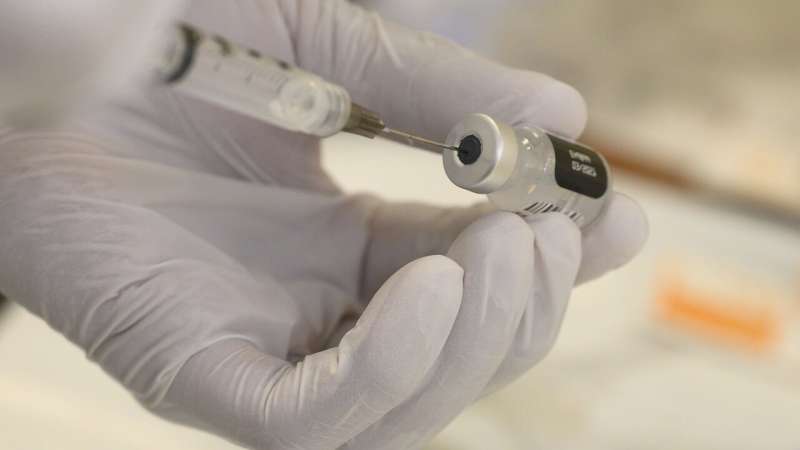
Up to a third of patients taking methotrexate—a common treatment for immune mediated inflammatory conditions such as rheumatoid arthritis and psoriasis/psoriatic arthritis—failed to achieve an adequate immune response to mRNA COVID-19 vaccines in a small study accepted for publication in the journal Annals of Rheumatic Diseases.
While mRNA COVID-19 vaccines have been shown to produce an effective immune response in over 90% of healthy adults in clinical trials, it is unknown whether the immune response is as robust in patients with immune-mediated inflammatory diseases (IMID) who may also be taking immunomodulatory medications.
The authors assessed the immune response to the mRNA Pfizer-BioNTech COVID-19 vaccine in 82 patients with immune-mediated inflammatory diseases (mainly psoriasis/psoriatic arthritis and rheumatoid arthritis) receiving methotrexate or an alternative immunomodulator (mainly TNF inhibitors and other biologics) at two centres—New York University Langone Health (New York, USA) and FAU Erlangen-Nuremberg and Universitatsklinikum Erlangen (Erlangen, Germany).
The study found that the Pfizer-BioNTech vaccine induced adequate antibody levels in up to a third fewer patients on methotrexate, when compared with healthy participants and patients with IMIDs on the other immunomodulatory drugs.
Adequate antibody levels were produced in over 90% of the 208 healthy participants and 37 patients on biologic or non-methotrexate oral treatments, but in only 62% of the 45 patients taking methotrexate.
Furthermore, while the vaccination induced activated CD8+ T cell responses in healthy participants and patients with immune-mediated inflammatory diseases not on methotrexate, this same induction was not seen in those patients on methotrexate. T cells are another part of the body’s immune defence system.
This is an observational study, and as such, can’t establish causality. The authors also acknowledge that the study had a small sample size, only assessed one type of mRNA COVID-19 vaccine, and could have included patients with previously asymptomatic COVID-19 infections.
They also point out that IMID patients on methotrexate were generally older than the comparison group (average age 63 vs 49) which may potentially explain some differences in immunogenicity.
Additionally, the authors emphasize that “it is not yet clear what level of immunogenicity is representative of vaccine efficacy.”
They go on to note that “although precise cut offs for immunogenicity that correlate with vaccine efficacy are yet to be established, our findings suggest that different strategies may need to be explored in patients with immune-mediated inflammatory diseases taking methotrexate to increase the chances of immunization efficacy against SARS-CoV-2 as has been demonstrated for augmenting immunogenicity to other viral vaccines.”
Methotrexate, for example, has previously been shown to reduce the immune response to the influenza vaccine.
The authors add: “Our results suggest that the optimal protection of patients with IMID against COVID-19 will require further studies to determine whether additional doses of vaccine, dose modification of methotrexate, or even temporary discontinuation of this drug can boost immune response as has been demonstrated for other viral vaccines in this patient population.”
British Medical Journal

